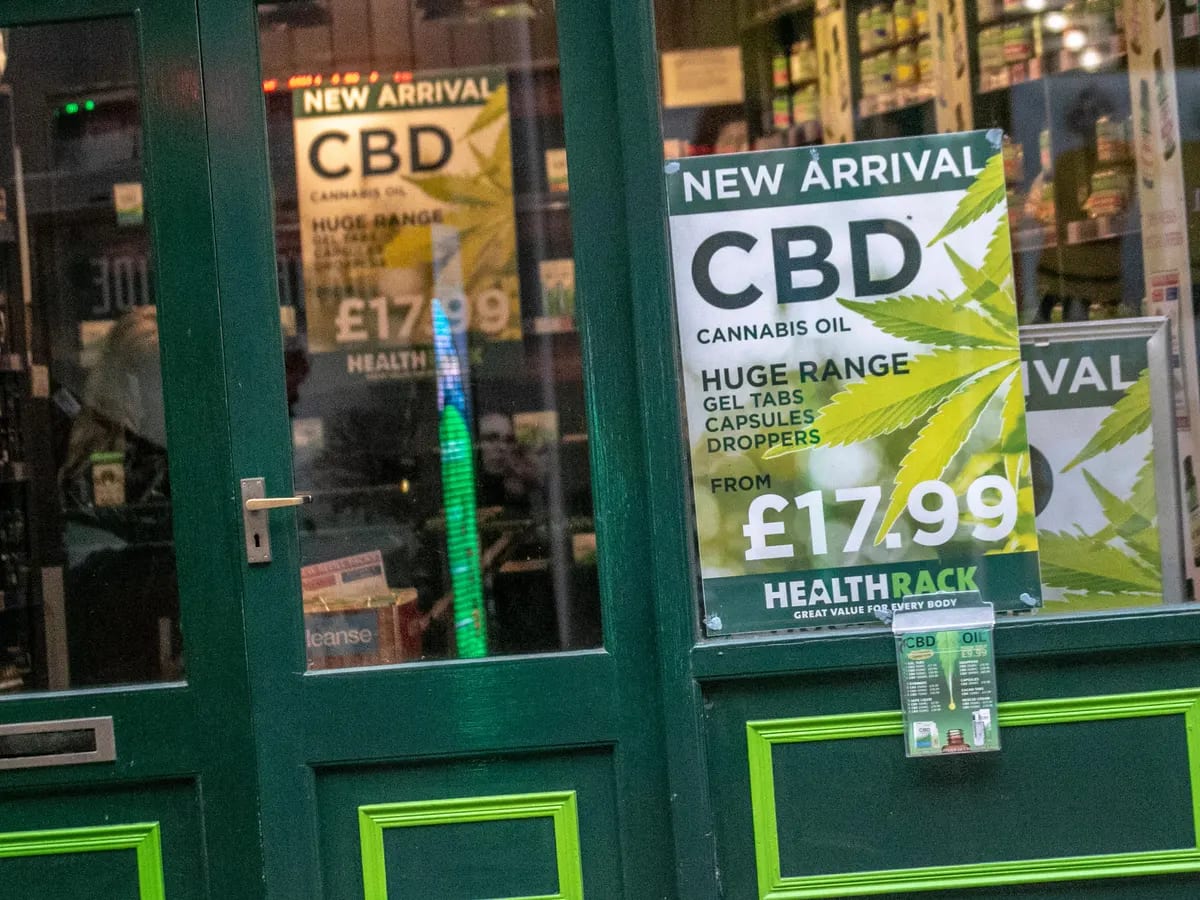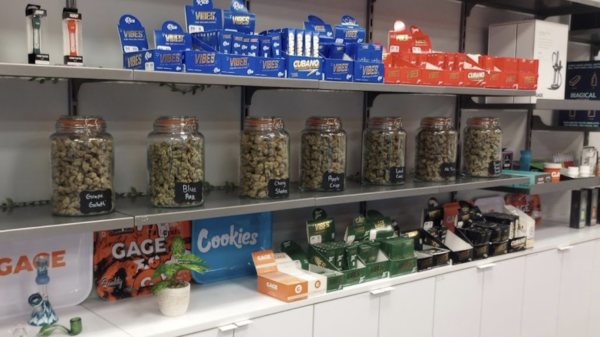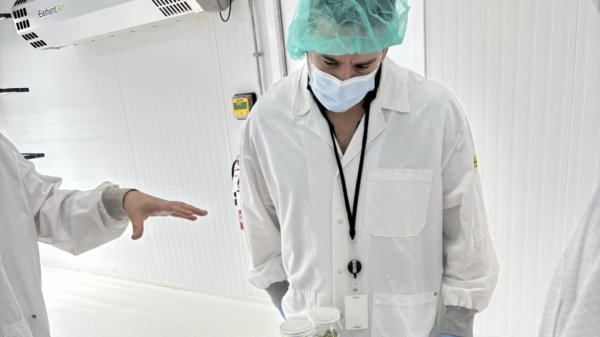After becoming the first cannabis firm to list on the London Stock Exchange in February, and recently striking an acquisition deal with international operator Materia, Kanabo Group Plc (LSE: KNB) is looking to lead the pack on medical pot in Europe.
The deal made international headlines, as both companies are cannabis investor darlings in their own right. Kanabo has established itself as the premier seller of medical-grade cannabis vaporizers in Israel and Europe, with a massive partnership with U.K. clinic giant Lyhpe Group.
Materia has put much effort into setting up medical cannabis distribution to pharmacies in Germany, Europe’s largest market for the product. And in May, the firm got EU GMP licensing for its facility in Malta, where it can process cannabis for distribution across the continent.
In the following Q&A, Mugglehead speaks to Kanabo CEO Avihu Tamir — joined by Materia CEO Deepak Anand — about his personal introduction to medical cannabis, how a paradigm shift of acceptance among doctors is happening faster abroad than in North America and how both firm’s operations dovetail to create Europe’s most disruptive player in the medical cannabis market.
The proceeding interview has been edited for length and clarity.
I understand you have a bit of a finance background. How did you decide to get into the cannabis industry?
So not exactly finance — I was in management consulting for Accenture, mainly utilities consulting. Still very, very different than the cannabis industry. My transition path was through being an entrepreneur. Along all those steps I understood that my personality is not corporate America.
I left and opened my first [IT] company, and ran an app with a partner for almost two years. Sold it to an Israeli company, and entered the cannabis industry from my personal experience. I was suffering from migraines almost all my life. I remember my mother sitting with me when I was a kid with a cloth on my head. And that was something that you just live with.
At the end of 2012, I met a physician, a neurologist, that had already something like 150 patients he treated with cannabis. And I was lucky because Israel had one of the first federally legal medical cannabis programs. So by then, there were already quite a lot of patients and support from physicians. I got my first medical cannabis prescription and discovered this world that is parallel to the medicinal world where you are getting products that were very bizarre to me.

Avihu Tamir’s journey with medical cannabis began when he was prescribed it to treat chronic migraines he had since he was a child. Submitted photo
I still remember the first education I got, a type of training on how you grow cannabis cigarettes, and I wasn’t a smoker. So that really turned on many lightbulbs. I was like, ‘Okay, there’s definitely a lot of innovation to do in this field.’ And that was my first business: I started to import vaporizers for medical cannabis.
I opened a company in Israel. We did import and distribution of flower-based vaporizers. It was very easy to get exclusives with all these big brands as they didn’t see Israel as a significant market. And it was quite easy to get market penetration because the only compare competitor you had here was the Volcano. And there’s a big price tag on it. That was the beginning. And from there started to learn the industry and what really is missing.
Fast forward a couple of years, and here you are listing on the London Stock Exchange. Obviously a lot has happened between now and then. Can you just give me just a quick rundown of your operations and a picture of your sales and distribution footprint?
Kanabo started as a research and development company. We have a research centre in Israel that’s focusing on preclinical trials. We’re going to launch our first clinical trial before the end of this year. Our flagship product is a medical cannabis vaporizer.
It looks very similar to vape pens in North America, but with three unique points. The first one is metered dosing. Each inhalation is approximately one milligram, so physicians can actually prescribe an exact dose. All the materials are medical-grade materials that passed preclinical testing for a medical device. And the third part that is quite unique is that the cartridges are sterile. So even when they reach the processing facility for filling, the cartridges are already closed, locked, have a silicon stamp and the process of filling them is a type of injection process so you never have any contamination in the cartridge itself.
This gave us the ability to bring vape pens into markets outside of North America for the first time, to purely medical markets. Right now the device has approval as a medical device in Israel. We’re very close to receiving the CE European medical device approval.
We are selling two types of product lines. One is the wellness, non-THC product line in Germany and in the U.K. The other one is a purely medical one, the first product for pain management with high THC, being launched right now in the U.K. That will be the first time a vape is in a medical market outside of North America.
You have your main operations in Israel, and then you obviously have a distribution that goes to the U.K. and in Germany, but do you have your own production?
Our supply chain is mainly based on contract manufacturers. The research and development centre is fully owned by Kanabo. The IP being developed, the formulations that are being developed are all in-house IP.
We have two contract manufacturers where we establish the production line from buying the equipment, the protocols and training. One of them is in the U.K. focused mainly on wellness and CBD, and the other one is PharmaCann Polska that has EU GMP certification and produces medical cannabis formulas for us.
We announced an agreement a few weeks ago with Lyphe Group, the biggest clinic group in the U.K. I think they have approximately 60 per cent of the country’s market. Sounds big but the U.K. market is still very small. But something definitely is happening there. I will probably say that right now in terms of growth rates, it’s the fastest growing market in Europe.
Yeah, the U.K. had its CBD health food regulations come online this year. And then also that big task force document handed directly to Boris Johnson office, so definitely indicating that they want to have more economic development on the medical cannabis file.
Dr. Dan Poulter has joined our board of directors. He’s a member of parliament in the U.K. and the former minister of health. It’s amazing to see someone that is both a practicing physician and basically responsible for the NHS (National Health Service), and the level of support he has for cannabis. And it’s mainly coming from the idea that cannabis is a safer alternative for a lot of pharmaceuticals being prescribed.
Read more: UK task force recommends moving cannabis licensing to health departments
Read more: With world-leading CBD rules, UK market to reach $1.2B in 2021
The biggest change I’m seeing in Israel and Europe is the way that physicians view opiates. I don’t know if it’s the same in North America, but it’s just 180 degrees here. Right now, it’s literally being perceived as something much worse than cannabis.

The U.K. passed rules this year to regulate CBD goods as health products. Image via Deposit Photos
Obviously, for us, that’s a given because we’re in the cannabis industry. But for many old school physicians, cannabis was the evil plant that doesn’t have enough scientific tests or evidence. Until two years ago, that’s what I would hear when I was speaking with physicians. And now it’s changing. And that’s where I think the coin dropped: understanding that this is a safe alternative for opiates or even benzos.
It’s definitely a mixed bag over here. There is some awareness of cannabis as medicine, but we have these awful overdose crises being driven by a drug supply tainted by prescription opiates, and they’re very slow to move on different alternatives. There is definitely knowledge here and it’s very in your face because it’s federally legal but there still is huge reluctance from the medical community to accept cannabis as a mainstream treatment.
Moving on to the Materia deal, how long had that been in the works?
I remember first meeting Deepak on a call we had two months ago, or something like that? Feels like a lifetime ago? To be perfectly honest, we were actively looking for opportunities. We had probably seen a dozen companies and you know how it happens, every time there’s something missing. You’re never happy.
Tell me about it. [laughs]
With Materia it was almost like love at first sight. There was not only a business fit by structure and assets. We are mainly a product development company in commercialization, investing in the Kanabo brand en route to market, and suddenly we’re meeting a company that has distribution in the biggest market in Europe — in Germany where we don’t have strong reach — and an EU GMP processing facility.
Read more: Materia secures EU GMP licence for largest certified facility in Malta
On top of that even, in the CBD world, we have a product line and Materia has an e-commerce platform for CBD. Everything was fitting quite well. But I believe mostly it’s just management: meeting people you understand, you can work with and you can move fast with. Most of the M&As that fail, fail because of different culture, fail because you have different business units that are pulling in directions that perhaps management doesn’t see as the vision. And that’s really the big success for me here. Deepak, Nick, the team — it’s a very good fit
So you’ve detailed your own distribution, and also Materia being able to bring in flower. I realize you have a couple other supply arrangements as well. So it definitely seems like over the past year or so that Kanabo has been looking for a lot of different strategic partnerships. Should investors expect that to continue?
I think anyone that is honestly looking at this market understands that we’re still in the stage of consolidation. Looking at Europe, and I think out of the six big cannabis companies, four are really operating in Germany. And they’re huge, significant companies. Small companies don’t really have the chance to be significant players without growing fast or being acquired.
You can be a niche player for sure. But consolidation is still here, and with Kanabo we made the decision that we’re not aiming to be acquired by a big cannabis player, but rather trying to lead the pack. And in the U.K., we have that opportunity. We’re literally the biggest public cannabis company right now in Europe.
We had a big advantage being first to be listed on the LSE and getting the support of investors. Now with Materia, and I just really emphasize all of this, because I strongly believe that the unique route to market Materia brings is a disruptive supply chain, because suddenly you can bring many new boutique, small cultivators in that have zero chance of otherwise entering the European market because of this huge barrier to entry of EU GMP.

Materia announced in May it had received EU GMP certification for its facility in Malta, allowing it to produce and distribute medical cannabis products throughout Europe. Photo via Materia
Farmers, cultivators have believed that in the two, three years, they’re going to be EU GMP, and sell into the European market. And then you meet them after a few years, and you see that this is really a huge hurdle. But with the strategy that Materia brings to market right now, it’s very feasible for a small cultivator in South America to be able to sell his product into the German market in several months. So Materia’s offering here is unique. There is nothing like that. The big players are not going to start enabling small cultivators to compete with them. And that’s what’s unique, this really disruptive type of almost like, share economy to the industry.
Over in North America, there’s obviously a lot of consolidation happening. Obviously it’s a very different scene here, especially in Canada, but all the large firms initially focusing on rapidly expanding capacity — and everyone guessing at the market size — led to a massive shakeout. In your view, how do you balance corporate growth while maintaining strong fundamentals?
I’m guessing we’ll get to where Canada is today in two years. And the main reason is that it is very fragmented, much more even than the U.S., because it’s different countries, different regulations in each state working in silos. But I see this as an opportunity as well. There’s a massive barrier to entry. On top of the EU GMP, on top of what Kanabo was dealing with, with our medical device, you have various countries building supply chains working with different regulations in each country in Europe, and different languages. That’s why you’re not going to see small companies operating in Europe.
I’m assuming that U.S. companies will not open facilities here. They will probably do very similar to what Curaleaf did: M&As. And that’s the only strategy they will be able to use to get in. That’s why there’s such huge potential. You have to put your infrastructure in correctly as the market is starting to grow. And then you’re in, you want to be where once you enter you can close the door behind you and there’s barriers to entry for others. There will be much less competition.
There’s health insurance coverage in most European countries for cannabis. So when a supplier is selling a gram of flower for $30, patients will pay something like 20 per cent of this. So just massive potential. It’s just a matter of time because at the end of the day the European market is a huge market. Some say it will be bigger — I would say probably the same size as the U.S. market.
Deepak Anand: Two points from my side: One, I think that having a team on our side that has looked at what’s happened in Canada provides a lot of valuable lessons. What I mean by that specifically is we’re not setting up 100,000 to 500,000 square-feet indoor cultivation facilities in Malta, Israel or the U.K., or anywhere else, because we’ve seen the pitfalls of cultivation and the challenges that come about as a result of that.
On the flip side, we’ve also seen the global supply chain emerge. Places like Latin America have come onstream. I think the challenges Avihu was explaining lie in the ability to be able to bring that biomass into Europe in a compliant manner.
That’s not something that we see in Europe happening on any large scale. We still see a number of cultivators trying to operate in very fancy jurisdictions and start to set up massive cultivation facilities, which in our mind is not the right strategy. That’s the that’s the one side.
The second side is when you look at medical cannabis, I think North America has done a very poor job regulating it. We’ve done a good job calling it medicine, but we’ve done a really bad job of treating it like medicine. What I mean specifically by that is you can’t in Canada or in the U.S. go into a pharmacy and walk out with medical cannabis, just like you would any other prescription drug.
Whereas to contrast, in Europe you will only walk into pharmacy. That’s the only place that you could actually get medical cannabis. You’re able to speak to a pharmacist, you’re able to go through all of that process. Avihu briefly touched on the reimbursement side. That’s a significant chunk as well. In Canada, you only see Veterans Affairs cover some part of it, but in Germany, it’s across the board. Two-thirds of prescriptions are currently reimbursed by the federal government.
You’re not going to see other countries in Europe change the way that Germany, the U.K. and various other markets are going down this path of access to pharmacy.
How do you see medical cannabis, and especially, in your case medical cannabis tech, evolving over the next several years?
Avihu Tamir: The biggest thing you’ll see is the need for validation. I’d say the number one point I’m getting when meeting physicians in clinics is ‘Where are the clinical trials? Where is the data?’ They are used to seeing medicines that are past marketing authorization, got the stamp of the FDA. And that’s something you don’t have in cannabis. You have one medicine that is purely CBD by GW and that’s it.
It will take many years until you will see probably a whole-plant product that receives FDA approval. So the challenge is to do this type of education with physicians in the medical establishment. They totally are, I wouldn’t say brainwashed, but they live in this world that scientific and medical validation is: you’ve got it or you don’t got it.

Kanabo’s VapePod and different cannabis formulations. Submitted photo
So what we’re trying to do is take this path of product validation and product development to a medical standard. When you can produce, especially with vape products, toxicology reports, vape analysis, bioavailability, and really show physicians how the graph of cannabis in the blood from a vape looks compared to a tincture or an edible, or when smoking a joint. That’s where you see physicians starting to engage more.
They feel that there is more data, they understand the product, they understand how to prescribe it. And that’s really where you can maybe remove some of these roadblocks that you have in a conservative market. And let’s face it, probably 90 per cent of the world is not in the cannabis hub yet.
This is really the key. It’s not in the innovation of new technologies and products, because you already have so many different delivery methods. Now you need to actually validate this and show real data in order to convince anyone from the medical establishment.
nick@mugglehead.com














